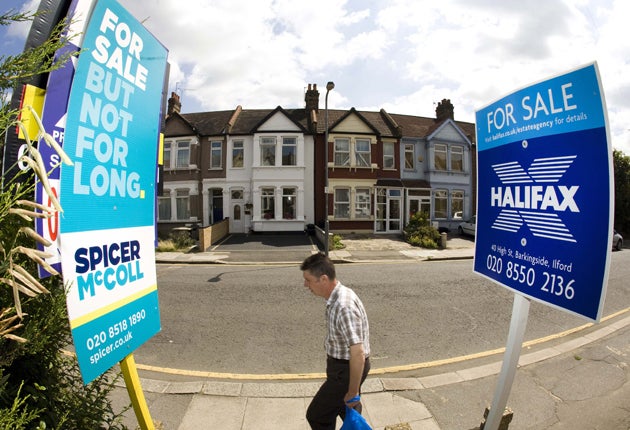House prices record worst monthly fall ever

Your support helps us to tell the story
From reproductive rights to climate change to Big Tech, The Independent is on the ground when the story is developing. Whether it's investigating the financials of Elon Musk's pro-Trump PAC or producing our latest documentary, 'The A Word', which shines a light on the American women fighting for reproductive rights, we know how important it is to parse out the facts from the messaging.
At such a critical moment in US history, we need reporters on the ground. Your donation allows us to keep sending journalists to speak to both sides of the story.
The Independent is trusted by Americans across the entire political spectrum. And unlike many other quality news outlets, we choose not to lock Americans out of our reporting and analysis with paywalls. We believe quality journalism should be available to everyone, paid for by those who can afford it.
Your support makes all the difference.The UK's fragile economic recovery was exposed by Halifax's influential house price survey yesterday, which revealed the largest monthly fall in property values on record.
The respected index showed that house prices dropped by 3.6 per cent last month, becoming the latest in a line of economic indicators that have suggested that confidence is weak ahead of the Comprehensive Spending Review in two weeks' time. The review is likely to lead to extensive cuts to public spending and the loss of thousands of public sector jobs.
The Government says the cuts are vital to maintain the confidence of the markets, to assuage fears that the UK could face a sovereign debt crisis, and keep its much-vaunted triple-A credit rating.
Halifax downplayed the significance of the monthly fall, saying that the three-month average is a more reliable indicator. The bank, which is now part of the Lloyds Banking Group, reported that, in three months to September, prices fell by 0.9 per cent.
"Looking at quarterly figures – a better measure of the underlying trend, house prices in the third quarter of 2010 were 0.9 per cent lower than in the second quarter of 2010," said Halifax's chief economist Martin Ellis.
"This rate of decline is significantly slower than the quarterly changes of between minus 5 per cent and minus 6 per cent that were seen in the second half of 2008. It is therefore far too early to conclude that September's monthly 3.6 per cent fall is the beginning of a sustained period of declining house prices."
The average price of a house in the UK is now £162,096, a 2.6 per cent increase on the level a year ago. Howard Archer, the chief economist at IHS Global Insight, described the headline monthly fall as an "absolute shocker" but agreed that volatile nature of monthly changes made them unreliable. "The Halifax data highlights how volatile housing market data can be on a month-to-month basis and from survey to survey, so it is best not to attach too much importance to one piece of data. It is clear that the 3.6 per cent plunge in house prices reported by the Halifax in September is partly a correction to the surprising rises reported in August and July which conflicted with other data and surveys," he said.
Nonetheless, the fall in prices will reignite concerns that the housing market is set to reverse. The Halifax figures came a day after the International Monetary Fund (IMF) described the outlook for the UK's property market as "worrisome". In its World Economic Outlook, published ahead of this weekend's meeting in Washington, the IMF said: "What remains worrisome ... is that house prices are still high based on traditional valuation yardsticks, and policy support may not be enough to prevent further correction."
The IMF's concerns about a double dip in the housing market were not shared by Simon Rubinsohn, the chief economist at the Royal Institution of Chartered Surveyors (Rics), who yesterday said that while house prices are likely to continue to slide, the chances of a severe decline are slim.
"Rics expects prices to slip a little further over the coming months, but despite the prospect of public spending cuts we believe the risk of large house price falls remains relatively limited," he said. "Key Rics lead indicators measuring the gap between demand and supply suggest the gap is already beginning to narrow which points to a more stable picture emerging for the early part of 2011."
Join our commenting forum
Join thought-provoking conversations, follow other Independent readers and see their replies
Comments